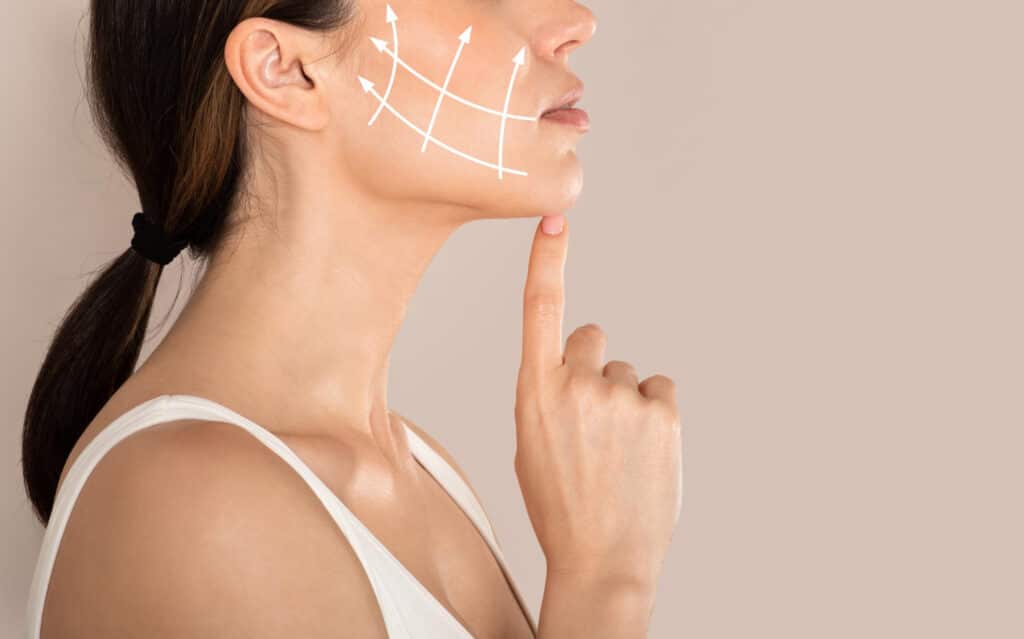
Dr Debbie Woo: What’s the Link Between Diet and Saggy Skin? You’d Be Surprised
- March 18, 2024


We’ve long been aware of the link between the food we eat and our skin, especially acne – but did you know a high sugar diet can also contribute to saggy skin?
In this blog post, we shed light on the relationship between a high-sugar diet and saggy skin, exploring the science behind it and discussing how professional treatments can help.
Let’s first define what a high-sugar diet entails. A high-sugar diet is characterised by the excessive consumption of added sugars, commonly found in sugary beverages, processed foods, and sweets. These sugars include sucrose, fructose, and high-fructose corn syrup.
The World Health Organisation recommends a daily sugar intake of less than 10% of total energy intake. When your daily sugar intake surpasses the recommended limits, it can trigger various adverse effects on your health, including your skin’s elasticity.
One of the fundamental mechanisms through which a high-sugar diet can contribute to saggy skin is glycation. Glycation is a natural process in the body where sugar molecules bind to proteins, forming advanced glycation end products (AGEs).
These AGEs can accumulate in the skin’s collagen and elastin fibres, causing them to become stiff and less flexible. As a result, your skin loses its natural elasticity, leading to sagging.
Collagen is a protein integral to the skin’s structure and firmness. Unfortunately, excessive sugar intake can lead to collagen degradation.
AGEs not only affect collagen flexibility but also promote collagen fibres’ breakdown. This dual assault on collagen can significantly accelerate the development of sagging skin.
High-sugar diets can trigger inflammation throughout the body, including the skin. Chronic inflammation can damage skin cells and disrupt collagen and elastin production.
Over time, this can contribute to the loss of skin firmness and elasticity, making sagging skin more noticeable.
Consuming excess sugar over an extended period leads to weight gain and obesity. Carrying extra weight can stretch the skin beyond its natural capacity, causing it to lose its elasticity.
Furthermore, fat cells release inflammatory substances that can further damage the collagen and elastin fibres in the skin, exacerbating sagging.
Sugar is known to be dehydrating. Too much sugar can draw water from your skin, leaving it dry and less elastic.
Dehydrated skin is more prone to sagging, as adequate hydration is essential for maintaining skin elasticity. However, chugging water is not a direct solution to increasing skin hydration. While drinking plenty of water is recommended for skin and overall health, the best way to moisturise skin is through treatments like Skinboosters.
Skinboosters contain hyaluronic acid, a natural substance found in the body that helps maintain skin moisture and elasticity. When injected into the skin, skinboosters replenish hydration, improve skin texture, and provide a youthful glow.
A high-sugar diet tends to be low in essential nutrients vital for healthy skin. Nutrients, including vitamins A, C, and E, and antioxidants are crucial in promoting skin health.
When your diet lacks these nutrients due to excessive sugar consumption, it can impair your skin’s ability to repair and regenerate, affecting its firmness.
While a high-sugar diet can contribute to saggy skin, it’s essential to acknowledge that other factors influence skin elasticity.
Smoking, excessive alcohol consumption, lack of exercise, and poor skincare habits can all impact the firmness and elasticity of your skin. Maintaining a healthy lifestyle can complement dietary changes in improving skin health.
Genetics may determine your skin’s natural elasticity. Some individuals are genetically predisposed to sagging skin, while others may age with fewer visible effects.
Your diet has a hand in maintaining the firmness and elasticity of your skin. Here are some dietary changes you can make to protect your skin against sagging.
As discussed earlier, excessive sugar consumption can lead to glycation, collagen degradation, and skin sagging. Limit sugary foods and beverages, including sodas, candies, and processed snacks, to maintain skin firmness. For healthier alternatives, choose natural sweeteners like honey or natural maple syrup.
Protein is crucial for collagen production, so ensure you get enough through your diet. Sources of lean protein like poultry, fish, tofu, and legumes can help maintain skin firmness and prevent sagging.
Incorporate foods that naturally boost collagen production. These include bone broth, rich in collagen-building amino acids, and vitamin C-rich foods like citrus fruits, strawberries, and broccoli, which are essential for collagen synthesis.
Antioxidants can protect your skin from oxidative stress and damage caused by free radicals. Incorporate colourful fruits and vegetables such as berries, oranges, spinach, and kale into your daily intake. These foods containing vitamins A, C, and E have antioxidant properties.
Healthy fats should be included in a nutrient-rich diet. These include olive oil, avocados, nuts, seeds, and fatty fish like salmon. They provide essential fatty acids that support skin health and keep it hydrated.
Adequate hydration is essential for maintaining skin elasticity. Drink enough water throughout the day to keep your skin hydrated from the inside out.
Processed and fried foods often contain unhealthy trans fats and additives that can contribute to skin inflammation and sagging. Opt for whole, unprocessed foods whenever possible.
Omega-3 fatty acids, such as those found in fatty fish, flaxseeds, and walnuts, have anti-inflammatory properties and can help maintain skin health by reducing inflammation.
Collagen supplements can provide additional support to promote firmness and protect against skin sagging. They have grown popular for their ease of use and can be included in your daily skincare routine. We advise that you consult with a healthcare professional before doing so.
If you have concerns about your skin sagging and want to do more than change your diet, you may be interested in exploring professional treatments. SL Aesthetic Clinic offers non-surgical solutions to address sagging skin.
Sylfirm X is a non-invasive skin tightening treatment that utilises microneedling technology. It stimulates collagen production and tightens loose skin, helping to restore firmness and elasticity.
This treatment can be particularly effective for saggy skin caused by glycation and collagen degradation.
Thermage FLX is a non-surgical radiofrequency treatment designed to tighten and lift sagging skin. The device emits radiofrequency waves that penetrate the skin layers to kickstart collagen production, resulting in gradual and natural-looking improvements. This treatment is suitable for various areas of the face and body.
Fotona 6D is a non-surgical facelift alternative treatment designed to target the entire thickness of skin from the internal oral mucosa all the way to the exterior facial skin. It improves skin complexion, while also rejuvenating and tightening the skin. There is little to no downtime with this treatment.
Ultherapy uses ultrasound technology to lift the eyebrows, neck and chin. It improves fine lines and wrinkles, while also stimulating the growth of new collagen within the skin. As a result, your skin will look tighter and more youthful.
HIFU, or high-intensity Focused Ultrasound, is used for face-lifting and skin tightening. It helps to add more definition to your jawline and neck. At the same time, it can also minimise fine lines and wrinkles around your eyes, forehead and mouth.
A high-sugar diet can indeed contribute to saggy skin. Processes such as glycation, collagen degradation, inflammation and weight gain affect the skin’s elasticity. Besides making dietary changes to reduce sugar intake and improve overall health, you may also consider professional treatments for saggy skin.
SL Aesthetic Clinic offers a range of non-invasive treatments to address skin sagging. Our experienced skin tightening professionals in Singapore can examine your skin elasticity and tailor a treatment plan to help you achieve firmer, more youthful-looking skin.
Book a consultation today.
Like what you read? Share them!